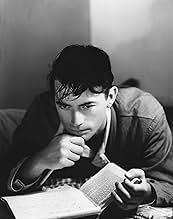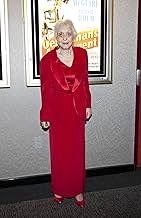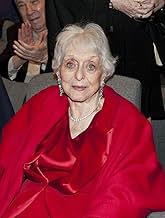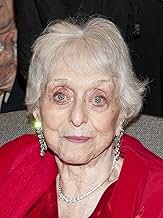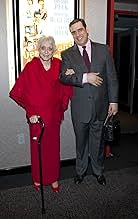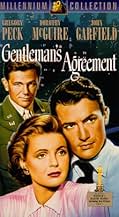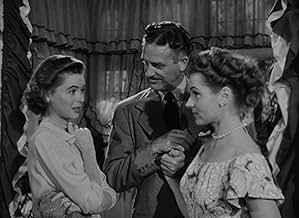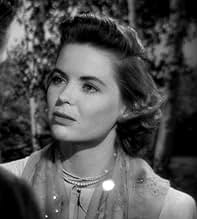Un giornalista finge di essere ebreo per raccontare una storia sull'antisemitismo e scopre personalmente le vere profondità del bigottismo e dell'odio.Un giornalista finge di essere ebreo per raccontare una storia sull'antisemitismo e scopre personalmente le vere profondità del bigottismo e dell'odio.Un giornalista finge di essere ebreo per raccontare una storia sull'antisemitismo e scopre personalmente le vere profondità del bigottismo e dell'odio.
- Vincitore di 3 Oscar
- 12 vittorie e 8 candidature totali
- Waiter
- (non citato nei titoli originali)
- Nightclub Patron
- (non citato nei titoli originali)
- Mother
- (non citato nei titoli originali)
Best Picture Winners by Year
Best Picture Winners by Year
Trama
Lo sapevi?
- QuizIn 1984 Gregory Peck claimed to have been misquoted in a 1967 interview in which he said Elia Kazan was the wrong director for the film. The actor said, "That's a misunderstanding. I don't think there could have been a better director for the film. What I meant was that he and I didn't have a rapport; emotionally, we were not on the same wave length. I don't think that I did my best work for him. If I worked with him now--as a mature man--I think I would give him everything he would want."
- BlooperEarly on, when Phil reminisces about his Jewish friend, Dave, he looks into the mirror and assesses his own features as being consistent with those of the Jews. This reveals his own experiences of having been influenced by the false stereotype of there being a "Jewish look". This is antithetical to his attacking anti-Semitic thoughts and actions in others, throughout the film. This, however, should not be considered a "GOOF" as many people are guilty of hypocrisy.
- Citazioni
Kathy Lacey: You think I'm an anti-Semite.
Phil Green: No, I don't. But I've come to see lots of nice people who hate it and deplore it and protest their own innocence, then help it along and wonder why it grows. People who would never beat up a Jew. People who think anti-Semitism is far away in some dark place with low-class morons. That's the biggest discovery I've made. The good people. The nice people.
- Curiosità sui creditiThe main title theme begins with the Fox logo, replacing the usual Alfred Newman fanfare.
- ConnessioniFeatured in Precious Images (1986)
A "gentleman's agreement" is a euphemism for a polite, unspoken act of racial bigotry. Yes, a sort of wink to not allow blacks or hispanics or Jews into a certain resort or club or restaurant.
That's the real point of the movie. Not hard core racism or prejudice, but that subtle stuff, the stuff that goes on every day even now. And ultimately, it is aimed at the people who say, "I'm not prejudiced," and yet who let other people wink and act like polite bigots.
There is a lot of background to the movie, in the making and acceptance of it in the industry and in the country (in short, Hollywood insiders avoided the idea and the public liked it). But the main point is how the movie works and plays out as a story, then (in our heads) and now (on the screen).
The answer? Very well. Yes, it's "preachy" of course. Of course! That's what a message movie does. But does it do it well? Yes, but it does mean there is a lot of talking. The key talker and thinker is main character, goy journalist Phil Green, played by Gregory Peck. He struggles out loud through how to approach an article he has to do on anti-Semitism with his mom, and then struggles through the actual highly veiled anti-Semitism of his potential wife, played by Dorothy McGuire. We know they are made for each other, but McGuire's character just can't quite get how her "looking the other way" or "feeling outrage" isn't enough.
The real acting gem is by Celeste Holm, who plays a sidekick, another writer, and someone who audiences probably want to see with Mr. Green because she has innate principles and the guts to show them. (She won an Oscar, too!) John Garfield, who was Jewish, plays an openly Jewish character in a deliberately restrained role as a returning G.I. It's 1947, and the country that has helped to save the remaining Jews in concentration camps is now wondering how to "save" them at home from internal barriers.
It might have been a mistake to set the movie in New York City, which was over a quarter Jewish at the time and probably had more familiarity with assimilation and difference than the movie implies (especially at the publisher's). But the scenes in stuff Connecticut make more sense. There is the love plot pushed on the whole thing, and the weirdly perfect house that was built and decorated but never lived in as if that's the future, waiting and ready. And yes, there is all the talking and moralizing.
But give director Elia Kazan credit for making this as fluid and involving as he has, and cinematographer Arthur Miller's beautiful post-War visuals hold up that end of the experience really well. And you know what, the "lessons" built into this kind of "message" film are worth sitting through because we all need reminders of how insidious our own prejudices can be, and how we need to constantly address them, openly.
- secondtake
- 3 giu 2010
- Permalink
I più visti
- How long is Gentleman's Agreement?Powered by Alexa
Dettagli
Botteghino
- Budget
- 1.985.000 USD (previsto)
- Tempo di esecuzione1 ora 58 minuti
- Colore
- Proporzioni
- 1.37 : 1
Contribuisci a questa pagina



